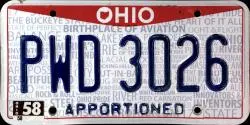Ohio Apportioned Plates

If you operate a commercial vehicle across state lines and your base state is Ohio, you'll likely need to register under the International Registration Plan (IRP). Instead of registering separately in each state, you pay apportioned fees based on the miles you drive in each area.
We simplify the IRP registration process for truckers and fleets, helping you get your apportioned plates quickly and without the paperwork headache.
IRP benefits include:
- One license plate and one cab card per vehicle
- Simplified renewal and reporting
- Legal compliance across multiple jurisdictions
How IRP Works in Ohio
Ohio participates in the IRP through the Bureau of Motor Vehicles (BMV). Carriers based in Ohio report the mileage they travel in each IRP jurisdiction and pay their share of registration fees accordingly. The state then issues a single Ohio apportioned plate and cab card that’s valid across all IRP regions. You must register under IRP in Ohio if your vehicle:
- Has a gross vehicle weight rating (GVWR) over 26,000 lbs, or
- Has three or more axles (regardless of weight), or
- Is used in a combination that exceeds 26,000 lbs total, and
- Travels in two or more IRP member jurisdictions
Requirements for IRP Registration in Ohio
To apply for IRP in Ohio, you'll need to meet several key requirements. These ensure your eligibility and compliance with both Ohio state regulations and the broader IRP agreement. Here’s what you need:
- Established Place of Business in Ohio: You must have a physical address in Ohio (not just a P.O. Box) where records are maintained and made available for audit purposes. If you don’t have one, you can appoint an agent. See Ohio IRP Business Requirements for details.
- USDOT Number: A valid USDOT number issued by the Federal Motor Carrier Safety Administration (FMCSA). You can apply for or update your information via the FMCSA Registration Portal.
- EIN or SSN: An Employer Identification Number (EIN) for companies or a Social Security Number (SSN) for sole proprietors.
- Vehicle Title and Lease Agreements: Provide proof of ownership or a valid lease agreement for each vehicle being registered. Titles must be in your name or the name of the leasing company.
- Proof of Insurance: You must carry and show proof of commercial vehicle liability insurance that meets federal and state minimum requirements.
- HVUT Proof (IRS Form 2290): Proof that you have paid the federal Heavy Vehicle Use Tax for any vehicle with a GVWR of 55,000 lbs or more. You can file and pay via the IRS HVUT page.
- Odometer or Distance Records: For renewals or new accounts (based on estimated mileage), distance records must be maintained for audit purposes.
How to Apply for IRP in Ohio

You have three main options:
- Online: Use the Ohio BMV IRP portal to complete the registration process.
- In Person: Visit an IRP processing center in Ohio.
- Third-Party Services: Let us handle the paperwork, filing, and communication for you.
Ohio IRP accounts must be renewed annually. Before renewing, review and update mileage for each jurisdiction, verify all vehicle and ownership information, and file Form 2290 (if not already filed). Late renewals may result in fines or loss of driving privileges.
Start Your Ohio IRP Registration Today
Need Ohio apportioned plates? Our expert IRP registration services make the process simple and hassle-free. Whether you’re a new carrier or managing a fleet, we handle the paperwork, filings, and compliance so you can focus on your business. Call us or click “Get a Quote” now to get started with fast, accurate, and reliable Ohio IRP registration.
